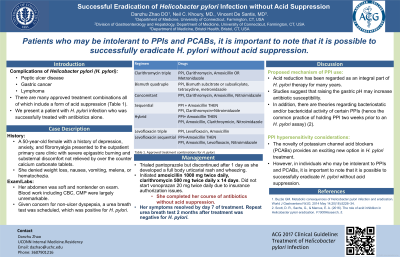Sunday Poster Session
Category: Stomach
P1690 - Successful Eradication of Helicobacter pylori Infection Without Acid Suppression
Sunday, October 27, 2024
3:30 PM - 7:00 PM ET
Location: Exhibit Hall E

Has Audio

Danzhu Zhao, DO
University of Connecticut Health Center
WEST HARTFORD, CT
Presenting Author(s)
Danzhu Zhao, DO1, Neil Khoury, MD2, Vincent DeSantis, MD3
1University of Connecticut Health Center, Farmington, CT; 2UConn Health, Hartford, CT; 3Bristol Health Medical Group, Southington, CT
Introduction: Successful treatment of Helicobacter pylori (H. pylori) is crucial in preventing and treating complications such as peptic ulcer disease, gastric cancer and lymphoma (1). There are many approved treatment combinations all of which include a form of acid suppression. We present a patient with H. pylori infection who was successfully treated with antibiotics alone.
Case Description/Methods: A 50-year-old female with a history of depression, anxiety, and fibromyalgia presented to the outpatient primary care clinic with severe epigastric burning and substernal discomfort not relieved by over the counter calcium carbonate tablets. She denied weight loss, nausea, vomiting, melena, or hematochezia. Her abdomen was soft and nontender on exam. Blood work including CBC and CMP were largely unremarkable. Given concern for non-ulcer dyspepsia, a urea breath test was scheduled, which was positive for H. pylori. She was instructed to trial pantoprazole after completion of the breath test but discontinued after 1 day as she developed a full body urticarial rash and wheezing. She was subsequently initiated on amoxicillin 1000 mg twice daily, clarithromycin 500 mg twice daily and vonoprazan 20 mg twice daily for 14 days. The vonoprazan delivery was delayed due to logistical issues such as a prior authorization requirement; however, she received and completed her course of antibiotics without acid suppression. Her symptoms resolved by day 7 of treatment. Repeat urea breath test 2 months after treatment was negative for H. pylori confirming eradication.
Discussion: Acid reduction has been regarded as an integral part of H. pylori therapy for many years. Studies suggest that raising the gastric pH may increase antibiotic susceptibility. In addition, there are theories regarding bacteriostatic and/or bactericidal activity of certain PPIs (hence the common practice of holding PPI two weeks prior to an H. pylori assay) (2). The novelty of potassium channel acid blockers (PCABs) provides an exciting new option in H. pylori treatment. However, in individuals who may be intolerant to PPIs and PCABs, it is important to note that it is possible to successfully eradicate H. pylori without acid suppression.
References:
1. Buzás GM. Metabolic consequences of Helicobacter pylori infection and eradication. World J Gastroenterol WJG. 2014 May 14;20(18):5226–34.
2. Scott, D. R., Sachs, G., & Marcus, E. A. (2016). The role of acid inhibition in Helicobacter pylori eradication. F1000Research, 5.
Disclosures:
Danzhu Zhao, DO1, Neil Khoury, MD2, Vincent DeSantis, MD3. P1690 - Successful Eradication of <i>Helicobacter pylori</i> Infection Without Acid Suppression, ACG 2024 Annual Scientific Meeting Abstracts. Philadelphia, PA: American College of Gastroenterology.
1University of Connecticut Health Center, Farmington, CT; 2UConn Health, Hartford, CT; 3Bristol Health Medical Group, Southington, CT
Introduction: Successful treatment of Helicobacter pylori (H. pylori) is crucial in preventing and treating complications such as peptic ulcer disease, gastric cancer and lymphoma (1). There are many approved treatment combinations all of which include a form of acid suppression. We present a patient with H. pylori infection who was successfully treated with antibiotics alone.
Case Description/Methods: A 50-year-old female with a history of depression, anxiety, and fibromyalgia presented to the outpatient primary care clinic with severe epigastric burning and substernal discomfort not relieved by over the counter calcium carbonate tablets. She denied weight loss, nausea, vomiting, melena, or hematochezia. Her abdomen was soft and nontender on exam. Blood work including CBC and CMP were largely unremarkable. Given concern for non-ulcer dyspepsia, a urea breath test was scheduled, which was positive for H. pylori. She was instructed to trial pantoprazole after completion of the breath test but discontinued after 1 day as she developed a full body urticarial rash and wheezing. She was subsequently initiated on amoxicillin 1000 mg twice daily, clarithromycin 500 mg twice daily and vonoprazan 20 mg twice daily for 14 days. The vonoprazan delivery was delayed due to logistical issues such as a prior authorization requirement; however, she received and completed her course of antibiotics without acid suppression. Her symptoms resolved by day 7 of treatment. Repeat urea breath test 2 months after treatment was negative for H. pylori confirming eradication.
Discussion: Acid reduction has been regarded as an integral part of H. pylori therapy for many years. Studies suggest that raising the gastric pH may increase antibiotic susceptibility. In addition, there are theories regarding bacteriostatic and/or bactericidal activity of certain PPIs (hence the common practice of holding PPI two weeks prior to an H. pylori assay) (2). The novelty of potassium channel acid blockers (PCABs) provides an exciting new option in H. pylori treatment. However, in individuals who may be intolerant to PPIs and PCABs, it is important to note that it is possible to successfully eradicate H. pylori without acid suppression.
References:
1. Buzás GM. Metabolic consequences of Helicobacter pylori infection and eradication. World J Gastroenterol WJG. 2014 May 14;20(18):5226–34.
2. Scott, D. R., Sachs, G., & Marcus, E. A. (2016). The role of acid inhibition in Helicobacter pylori eradication. F1000Research, 5.
Disclosures:
Danzhu Zhao indicated no relevant financial relationships.
Neil Khoury indicated no relevant financial relationships.
Vincent DeSantis indicated no relevant financial relationships.
Danzhu Zhao, DO1, Neil Khoury, MD2, Vincent DeSantis, MD3. P1690 - Successful Eradication of <i>Helicobacter pylori</i> Infection Without Acid Suppression, ACG 2024 Annual Scientific Meeting Abstracts. Philadelphia, PA: American College of Gastroenterology.

